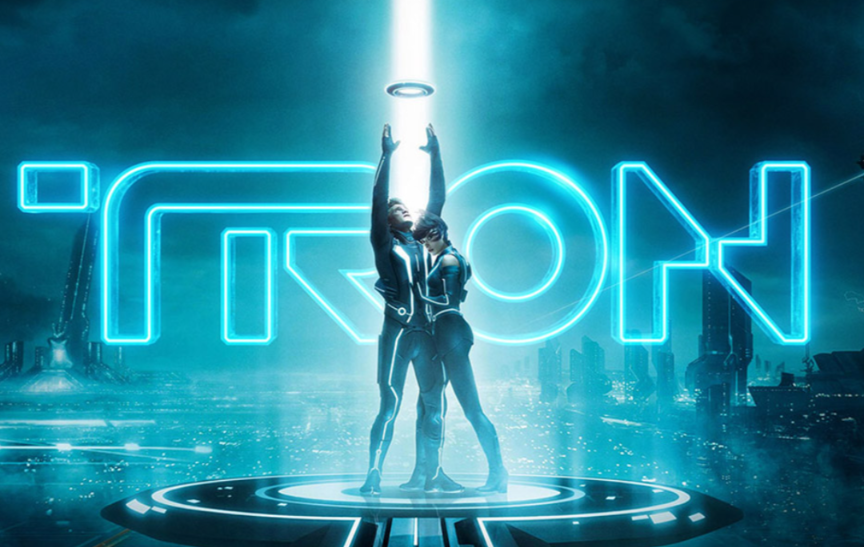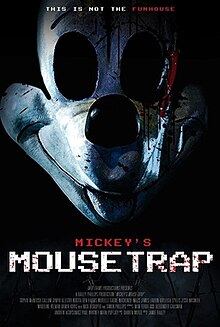‘Tron: Legacy’ IS a Cyberpunk Story
May 19, 2022
Rain pours down around you. Neon baths the night sky. Pools of shadow form beneath you as you sprint through the city streets. The skyline is bathed in a constant glow, as thunder explodes off in the distance somewhere. You sprint as fast as your legs can carry you. Behind you, are guards, who control the city you reside in. Alarms ring off in the distance. And your mind is racing just as fast as your feet. Suddenly you are blinded by a light, a search light above. There’s nowhere for you to go now. ‘End of line.’
If this sounds like the typical set up to your standard cyberpunk plot, you wouldn’t be far off. However, if I were to tell you that you just described the setting and tone of ‘Tron: Legacy,’ you might actually have to draw a blank.
Released in 2010, ‘Tron: Legacy’ tells the story of Sam Flynn (played by Garrett Hedlund,) whose father, the former CEO of a corporate conglomerate, mysteriously vanished. After many years, Sam receives a strange signal emanating from his dad’s old arcade. From there, Sam is sucked into the digital cyberworld his father created, and is forced to navigate its magnificent, yet dangerous environment that has long since advanced far past the intentions of its Creator.
With its synth fueled soundtrack, and its many thematic elements, ‘Tron: Legacy’ encompasses many aspects of what make the cyberpunk genre so enduring and so specific.
First things first: What is ‘cyberpunk?’ You’ve probably at least heard the term due to its present relevance. But fundamentally, “cyberpunk” is a subgenre of science fiction, which often touches on themes of corporate power, artificial intelligence, technological advancement, individualism and societal decay.
As a subgenre, cyberpunk has existed since the 1970s, being born out of the “New Wave,” a movement of science fiction which often pushed the boundaries of the conventions of the genre. However its look and atmosphere wouldn’t become established until the 1980s, with works like William Gibson’s Neuromancer and Ridley Scott’s ‘Blade Runner.’
Both stories took place in sprawling metropolises, where neon signs bathed the city skyline. These futures are wrought with crime and corporate greed. And the boundaries between technology and human identity have been so blurred to the point of interlinkage.
The main characters are flawed individuals who exist on the borders of the law, often getting into trouble with both law enforcement and corrupt corporations alike. And Technology has advanced so exceedingly, that aspects such as artificial intelligence and coding appear almost supernatural and organic.
From this, many genre writers began to attribute their works to being in this new “cyberpunk” style. When discussing the concepts of the movement, sci fi author and write Bruce Sterling says that “In the circle of American science fiction writers of my generation—cyberpunks and humanists and so forth—[Ballard] was a towering figure.”
“We used to have bitter struggles over who was more Ballardian than whom. We knew we were not fit to polish the man’s boots, and we were scarcely able to understand how we could get to a position to do work which he might respect or stand, but at least we were able to see the peak of achievement that he had reached.”
Now, with all this talk of technology, and robots and crime, where in the world does Tron: Legacy fit into all this?
Firstly, the world ‘Tron’ takes place within the digital world of the “The Grid.” On the Grid, the programs there resemble and act like humans, with personalities, jobs and lives.
For all intents and purposes, they seem and feel human, yet are not, existing only in the world they inhabit.
In stories like ‘Blade Runner,’ artificial intelligence has advanced so far that robots act and resemble humanoids, and the distinction between the two is often very hard to differentiate between. This is shown with the Replicants, genetically engineered,”robots” “composed entirely of organic substance,” created for slave labor.
They act and “feel” human, yet due to their shorter life spans and limited abilities, they are still synthetic. ‘Tron’ has characters that seem human; they act human and look human, yet something is off. They are not. They are robotic and artificial. And the separation between the two is what sets apart our hero, Sam, from those inside the Grid.
Similarly, Sam himself is a character that exists on the fringes of the law, both in the real world and the cyber world. Many characters who inhabit the cyberpunk landscape are often private eyes, criminals, hackers, minorities and those who live on the fringes of society.
In ‘Tron,’ Sam is shown to actively “fight” the establishment, by coming into conflict with the law as well as actively participating in corporate sabotage towards the company that hurt his father’s name, ENCOM.
He is a vigilante and is often shown to be arrested on several occasions in the first act of the film. This is then translated over to the Grid, where the totalitarian occupation that runs the system captures and forces Sam to participate in a number of gladiatorial “games.”
Sam is constantly on the run. His search for his father is in direct conflict to the corporate and technological superpowers of his journey. And due to this, he is often labeled as a criminal and a renegade.
In relation to this, ‘Tron,’ like many of the best cyberpunk stories, tackles themes of identity. What does this mean? What does it mean to be human? And how do you find yourself?
This is exemplified best in the characters of Clu and Quorra.
Clu is the leader of the regime that has taken the Grid captive. However, before his rise to power, he was once the program created by Sam’s father, Kevin Flynn, in order to “create a perfect system.”
In a way, Clu is the personification of a young ambitious man whose hubris got the better of him. Because in a way, literally and figuratively, Clu IS Flynn. He is his clone, a manifestation of his ambitions and hubris. Yet he lacks any of the wisdom or sense of defeat that Flynn has had to cope with.
And Flynn, after being years and years away from the one person he loved more than anything, is able to finally make things right with son. He can come out of hiding. And face himself.
On the other end, there is Quorra; Flynn’s apprentice and confidante. When the audience meets her, her wisdom of the world outside of the Grid is keenly deliberate and very accurate. She is a lethal warrior and she listensAnd audiences come to find out that she is an “ISO.”
In the Grid, the ISOs (short for ISOmorphic algorithms,) are programs born from the very system itself, not programmed by Flynn. They are able to adapt and learn, like humans. They truly blur the lines between machine and man. And Quorra is able to experience “humanity” not by her programming or by her genetics, but by her choices, her curiosity and her adaptititly.
She listens to Flynn’s teaching and grows not just physically (or I guess in this case digitally,) but morally, learning the importance of sacrifice and honor. In a way, she is able to “transcend” her limitations to become better.
And finally, and this can’t be stressed enough… but ‘Tron: Legacy’ has an absolute banger of a soundtrack!! Crafted by musical duo Daft Punk, the Grid oozes cyberspace, its electronic chords pound with the intense mixture of epic orchestral chords. It reverbs and rebounds all through the digital world. And this sound is known as Synthwave.
Synthwave,, (an electronic music genre that has roots in 80’s pop rock and EDM music,) is often a vital staple of cyberpunk.
It is the embodiment of the artificial, the programmable, the man-made; most of its music is digital, created inside a computer (much like the Grid itself) and is in essence, synthetic. And ‘Tron’ has a soundtrack that delivers that in spades.
In conclusion, ‘Tron: Legacy’ and its cyberspace story takes the cyberpunk genre and uses it as a template to tell a creative and very relevant story.
By playing around with the genre conventions, this neon fueled spectacle is able to take those conventions and utilize them to create compelling characters in a breathtaking environment fueled by synth soundtrack that you can’t stop listening to.
And with the ever growing advancement in technology, ‘Tron: Legacy’ couldn’t be more relevant and ripe for a revisit.
So “End of Line,” program. Time to jack into the Grid…















